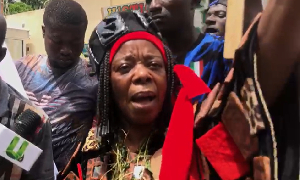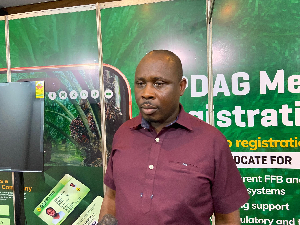It seems official Ghana government fascination with things Malaysian that begun under ex-president Jerry John Rawlings, continues unabated under his successor, president John Agyekum Kuffour. One would have thought that such slavish kowtow to things Malaysian would be jettisoned by the new government.
Under Jerry Rawlings, Malaysians were contracted to ?manage' Ghana's telephone system (Ghana Telcom), yet their tenure can best be remembered more for the utter contempt they held for their Ghanaian hosts, than to any managerial expertise they bequeathed to us.
The reader must not get me wrong, I am a great admirer of the success of the so-called "Asian Tigers", but we have more powerful predators in Africa than the tiger. Sadly, there are no "African Lions or Leopards", due to the predatory nature of our post-independence leaders on the African economy. Of course, there is corruption in Malaysia, as well. But a joke I heard years ago, and repeated by Keith Richburg in his book Out of America: A Black Man Confronts Africa (1998), puts the matter succinctly.
According to the joke, two students, one Malaysian, the other African (Ghanaian!), pursued graduate studies in the USA, and upon completion of their studies, returned home to plum jobs in their respective governments. Years later, the African visited his Malaysian friend, and was quite impressed by his friend's standard of living. Asked how he achieved, such standard, the Malaysian pointed to the modern highways, and government buildings as being the source of his wealth! He gained his wealth through the managing award of contracts; contracts that were completed to satisfaction.
Later, the Malaysian reciprocated the visit, and was equally impressed by the opulence shown by his African friend. Asked how he came into such wealth, the African pointed to the abandoned grassy field outside. In shock, the Malaysian shouted, but there is nothing there! To which the African responded, that is the point!! He gained his wealth by pocketing the money for the contracts intended for the development of the highway and other infrastructure.
The lesson here is that while in Africa (Ghana) officials embezzle government money earmarked for the development of a country's infrastructure, with impunity; in Malaysia for example, while officials may benefit from the award of contracts, laws are in place to ensure that the actual project stipulated in the contract is completed to acceptable standards. Thus, in Africa unlike other parts of the world, corruption is degenerative, and contributes to our seemingly eternal under-development.
So, lets not look to Malaysia for the solutions to our problems; the problems are home-grown, and the solutions are to be found at home. We must certainly learn to emulate the success of other countries; but the ongoing obeisance to Malaysia ought to stop.
Which brings me to the matter of the Presidential Press Conference held on October 3, 2002. It was a history-making epoch, because what passed for a presidential press conference in Ghana was quite laughable. Under previous governments, journalists would write their questions to the president or chef d'etat; who after several weeks will appear, and read the answers. Others did not hold any press conferences at all, because they did not see themselves as being accountable to the people!
I have written about some of the positive aspects of the president's performance, and the policy-goals of his government as delineated at the press conference. Unfortunately, the excellent performance by the president, has been overshadowed by the debate over what some see as his continuing obeisance to things Malaysian. Seldom has an excellent statement ended on a bad note, as the one provided by the president in outlining his government's development program at the press conference.
It seems the president of Ghana cannot wean himself from what he considers to be the success story of Malaysia. Hence, he is quick to suggest Malaysian prescription as the cure for our national ailments, no matter the usefulness or practicability.
What shocked me was the extent to which the president would go to suggest the creation of new ministries. According to our president, Ghana could create a Minster of Ghana Airways; and the Ports and Harbour "can also make a persuasive case for a Minister as well", because according to him, "in India, there is a full Minister in charge of Railways"! And what about Education, president Kufour asked? He provided an answer: "we.... need a Minister of Tertiary Education alone". And separate ministries for Roads; Transport; Lands; Forestry; Mines; etc., etc., etc. Folks the list is simply mind-boggling. Who is advising the president. How big is big?
And where did the president get his ideas from; you guessed it: Malaysia! According to the president of Ghana, the Prime Minister of Malaysia has "as many as 27 Ministers of State", in his office alone; in addition to the usual Cabinet Ministers. Jaded by that figure, I called the Malaysian Embassy in Washington, D.C., to ascertain the reality of that claim. Answers were not forthcoming, so I checked for the official Malaysian government website on the Internet.
I did so because president Kufour wanted a national debate on the matter. I also believe strongly that knowledge is power, and sharing that knowledge (writing about it) is empowering people.
I can confirm, according to the official website, that the president of Malaysia does not have "27 Ministers of State". In fact he has about 4 ministers; and a couple of deputy ministers, and parliamentary secretaries (not counting Cabinet Minsters). But the Malaysian Prime Minister also has a "Management Team" of 18 people, as well as other officials in his office who are not designated as Ministers. Above all, Malaysia is not Ghana; nor vice versa!!!
I hope the president of Ghana abandons this notion of creating more ministries forthwith. As he must have realized when he started reeling off the names, once you begin to create new ministries, you will never know when and where to stop. Furthermore, the creation of additional ministries will be a burden on the economy of Ghana. Nor will more ministries translate to better efficiency.
Ghana already has ministries that she can adequately do without. Most of our ministries replicate each other; as well as others that do not qualify for full ministries, at all. I thought the president would rather announce the abolition of certain ministerial positions that were obviously created to assuage political sensibilities. The position of Minister for Basic, Secondary and Girl-Child Education can be folded into the Ministry of Education, and the duties transferred to an empowered Deputy Minister of Education for that purpose.
In fact, the Ghana Education Service has a Director for Girls (and assume, ipso facto, Children's) Education. Other positions such as, Senior Minister; Minister for Fisheries; Ministers of State; Minister of Parliamentary Affairs; etc., etc., can be folded into positions of presidential advisors. Due to all these new ministerial creations, the government has not been able to appoint people to the important positions of Deputy Regional Commissioners for some regions, for fear of breaching constitutional mandates.
The president seems to think that an outfit will be better run if it were converted into a ministry. The most laughable one is "Minister of Ghana Airways". How many Class Three pupils does it take to change a light bulb?
What the president needs to do, is to empower officials wether they are ministers or not, in order for them to be able to do their job well. By seeming to place a higher premium on the title "Minister", the president unwittingly reduces the relevance and powers of offices that ought be designated as simply Presidential Advisors; or heads of specific agencies. Hence, under president Kufour, a presidential speech writer becomes a Minister of State!














